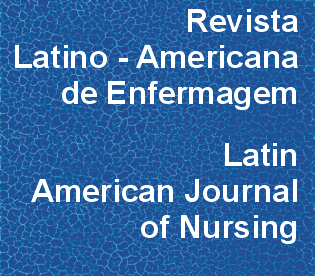Reliability of indicators of nursing care quality: testing interexaminer agreement and reliability
DOI:
https://doi.org/10.1590/0104-1169.3262.2407Abstract
OBJECTIVE: this study sought to test the interexaminer agreement and reliability of 15 indicators of nursing care quality. METHODS: this was a quantitative, methodological, experimental, and applied study conducted at a large, tertiary, public teaching hospital in the state of Paraná. For data analysis, the Kappa (k) statistic was applied to the categorical variables - indicators 1 to 11 and 15 - and the interclass correlation coefficient (ICC) to the continuous variables - indicators 12, 13, and 14, with the corresponding 95% confidence intervals. The categorical data were analyzed using the Lee software, elaborated by the Laboratory of Epidemiology and Statistics of Dante Pazzanese Institute of Cardiology - Brazil, and the continuous data were assessed using BioEstat 5.0. RESULTS: the k-statistic results indicated excellent agreement, which was statistically significant, and the values of the ICC denoted excellent and statistically significant reproducibility/agreement relative to the investigated indicators. CONCLUSION: the investigated indicators exhibited excellent reliability and reproducibility, thus showing that it is possible to formulate valid and reliable assessment instruments for the management of nursing care.Downloads
Download data is not yet available.
Downloads
Published
2014-04-01
Issue
Section
Original Articles
License
RLAE’s authorship concept is based on the substantial contribution by each of the individuals listed as authors, mainly in terms of conceiving and planning the research project, collecting or analyzing and interpreting data, writing and critical review. Indication of authors’ names under the article title is limited to six. If more, authors are listed on the online submission form under Acknowledgements. The possibility of including more than six authors will only be examined on multicenter studies, considering the explanations presented by the authors.Including names of authors whose contribution does not fit into the above criteria cannot be justified. Those names can be included in the Acknowledgements section.
Authors are fully responsible for the concepts disseminated in their manuscripts, which do not necessarily reflect the editors’ and editorial board’s opinion.
How to Cite
Reliability of indicators of nursing care quality: testing interexaminer agreement and reliability . (2014). Revista Latino-Americana De Enfermagem, 22(2), 234-240. https://doi.org/10.1590/0104-1169.3262.2407



